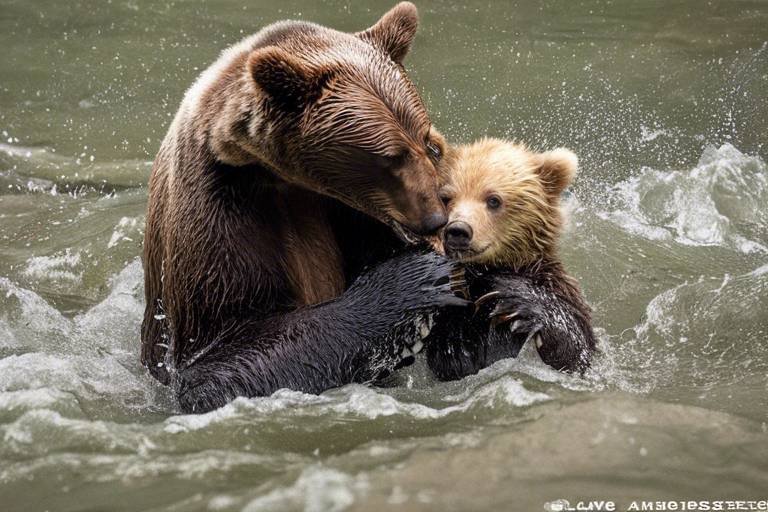Dangerous Diet - Threats Imposed by Feeding Bread to Ducks
Feeding bread to ducks may seem like a harmless and enjoyable activity, but it is crucial to understand the serious risks associated with this practice. Many people believe that giving bread to these charming birds is a way to bond with nature, yet this seemingly innocent act can have dire consequences for their health and the environment. Ducks, like all wildlife, have specific dietary needs that are often overlooked when humans choose to toss bread crumbs into ponds or lakes. By examining the implications of this practice, we can become more responsible stewards of our local ecosystems and ensure that these beautiful creatures thrive.
When ducks consume bread, they are not only missing out on vital nutrients but are also at risk of developing malnutrition and obesity. Bread lacks the essential vitamins and minerals that ducks require to maintain their health. Instead of nourishing their bodies, bread can lead to a range of health issues that compromise their well-being. Imagine feeding your child junk food every day; over time, their health would deteriorate. The same principle applies to ducks. By understanding the health risks associated with this practice, we can promote better feeding habits that will support the well-being of these birds.
Moreover, the environmental consequences of feeding bread to ducks cannot be overlooked. When large quantities of bread are thrown into water bodies, it can lead to pollution and disrupt local ecosystems. The excess bread left uneaten can decay, resulting in harmful algal blooms that can severely impact water quality. These blooms not only create unsightly scum on the water's surface but can also lead to deoxygenation, affecting fish and other aquatic life. It's like throwing a party in a small room without considering the mess left behind; eventually, it becomes unlivable for everyone involved.
Furthermore, the introduction of bread into aquatic environments can upset the delicate balance of species that rely on clean water. As ducks become reliant on human-provided bread, their natural foraging behaviors diminish. This shift can have a cascading effect, impacting their survival skills and overall health in the wild. Imagine a world where children no longer learn to cook because fast food is always available; similarly, ducks lose their instinctual behaviors when they rely too heavily on human handouts.
In conclusion, while feeding ducks may seem like a fun and innocent pastime, it carries significant risks that can affect both the birds and their habitats. By recognizing these dangers, we can make informed decisions about how to interact with wildlife. Instead of bread, let’s explore healthier alternatives that promote the well-being of ducks and preserve the integrity of our ecosystems.
- What should I feed ducks instead of bread? Consider offering grains like oats or corn, as well as fresh vegetables such as lettuce and peas.
- Why is bread harmful to ducks? Bread lacks essential nutrients and can lead to malnutrition and obesity in ducks.
- How does feeding bread affect the environment? Leftover bread can decay in water, causing pollution and harmful algal blooms that disrupt local ecosystems.
- Can ducks survive without human food? Yes, ducks are capable of foraging for their own food in the wild, and it is essential for their natural behaviors.

Health Risks for Ducks
Feeding bread to ducks might seem harmless, but it can actually lead to a plethora of severe health issues for these charming birds. One of the most alarming consequences of a bread-heavy diet is malnutrition. Ducks, like all creatures, require a balanced diet rich in nutrients to thrive. Bread, however, is often devoid of the essential vitamins and minerals that ducks need. Instead of nourishing them, it fills their stomachs with empty calories, leading to a condition known as "angel wing," where the wings grow abnormally due to a lack of proper nutrition.
Moreover, the overconsumption of bread can result in obesity. Just like humans, ducks can gain weight when they consume more calories than they expend. Obese ducks struggle to take flight, evade predators, and forage for food. This reliance on human-provided food sources diminishes their natural foraging instincts, which can have long-term repercussions on their survival skills. Imagine a duck waddling around, unable to lift off the ground, all because it was overfed by well-meaning park visitors!
It's essential to understand that the health risks extend beyond just individual ducks. A community of ducks that are fed bread can create a ripple effect in the local ecosystem. When ducks become accustomed to bread, they often congregate in large numbers, which can lead to overcrowding and increased competition for natural food sources. This competition can further exacerbate their health issues, as not all ducks will be able to access the food they need to maintain a healthy lifestyle.
In summary, while it might feel rewarding to toss some bread to the ducks at your local pond, it’s crucial to consider the long-term implications of such actions. Instead of contributing to their health problems, we should be looking for better alternatives that support their well-being and help them thrive in their natural habitat. By understanding the risks associated with feeding bread, we can make informed choices that benefit both ducks and the environment.

Environmental Consequences
Feeding bread to ducks may seem harmless, but it can have significant that ripple through local ecosystems. When people toss bread crumbs into ponds and lakes, they may not realize the potential harm they're causing. Excess bread can lead to a variety of issues, including pollution and alterations in the natural behaviors of waterfowl. Imagine a serene pond, once vibrant with life, now clouded and choked by the very food meant to nourish its inhabitants. This is not just a hypothetical scenario; it is a reality in many communities where bread feeding has become common.
One major environmental concern is the pollution caused by leftover food. When bread is thrown into the water, it doesn’t just disappear. Instead, it begins to decay, leading to harmful algal blooms. These blooms can create a toxic environment for aquatic life, affecting everything from fish to frogs. The decomposition of bread introduces excess nutrients into the water, which can lead to a cascade of negative effects, including:
- Decreased Water Quality: As bread decays, it contributes to nutrient overload in water bodies. This overload can result in low oxygen levels, which are detrimental to fish populations.
- Disruption of Aquatic Life: The introduction of bread can upset the delicate balance of species that rely on clean water for survival. Native fish and other wildlife may decline, leading to a less diverse ecosystem.
Furthermore, the impact on water quality cannot be overstated. Decomposing bread releases organic matter into the water, which can lead to eutrophication—a process where water bodies become overly enriched with nutrients. This results in excessive growth of algae, which can block sunlight and deplete oxygen levels in the water. Fish and other aquatic organisms struggle to survive in these conditions, leading to a decline in biodiversity. The once-thriving ecosystem becomes a shadow of its former self, struggling to maintain its ecological balance.
Additionally, altered duck behavior is a significant consequence of this practice. When ducks become reliant on human-provided bread, their natural foraging behaviors diminish. They may lose their ability to find food in the wild, which can affect their survival skills and overall health. Imagine a duck that once thrived in its environment, now struggling to adapt because it has become accustomed to an easy meal. This dependency can lead to a cycle of health issues, further exacerbating the environmental impact.
In summary, the practice of feeding bread to ducks carries with it a host of environmental consequences that can disrupt local ecosystems. From pollution to altered behaviors, the effects are far-reaching and detrimental. It’s crucial for us to understand these impacts and consider more sustainable alternatives that support both the ducks and their habitats.
Q1: Why is bread harmful to ducks?
A1: Bread lacks the essential nutrients that ducks need for a balanced diet. It can lead to malnutrition and obesity, making ducks more susceptible to diseases.
Q2: What happens to the bread that ducks do not eat?
A2: Leftover bread decays in the water, contributing to pollution and potentially causing harmful algal blooms that can affect water quality and aquatic life.
Q3: What are some healthy alternatives to bread for feeding ducks?
A3: Instead of bread, consider offering grains like oats or corn, and fresh vegetables such as lettuce and peas. These options provide essential nutrients without the negative impacts of bread.

Pollution from Leftover Food
When people toss leftover bread to ducks, they might think they are doing a good deed, but the reality is quite different. Leftover bread doesn't just disappear; it decays in the water, leading to a series of environmental issues that can be detrimental to both the ducks and the ecosystem they inhabit. Imagine a beautiful pond, filled with vibrant life, suddenly turning murky and lifeless because of a few slices of bread. This is the unfortunate consequence of overfeeding ducks with bread, and it’s a scenario that plays out more often than we’d like to admit.
The decomposition of bread introduces excess nutrients into the water, particularly nitrogen and phosphorus, which can trigger harmful algal blooms. These blooms not only make the water look unsightly, but they can also produce toxins that are harmful to both wildlife and humans. As these blooms flourish, they block sunlight from reaching underwater plants, which are vital for oxygen production. Without adequate sunlight, these plants struggle to survive, leading to a cascading effect on the entire aquatic ecosystem.
Let's break down the process a bit more:
- Step 1: Excess bread is left uneaten.
- Step 2: The bread begins to decompose, releasing nutrients into the water.
- Step 3: Nutrient overload leads to algal blooms.
- Step 4: Algal blooms block sunlight and deplete oxygen levels.
- Step 5: Fish and aquatic plants suffer, disrupting the food web.
In addition to harming the water quality, these algal blooms can lead to dead zones—areas in the water where oxygen levels are so low that aquatic life cannot survive. This creates a ripple effect that can decimate fish populations and alter the natural balance of species in the area. The introduction of bread into these ecosystems not only threatens the health of the water but also the very ducks we aim to help. They become reliant on a food source that is ultimately detrimental to their well-being.
In summary, while it may seem harmless to feed ducks leftover bread, the pollution caused by this practice has far-reaching consequences. It’s essential to understand that our well-intentioned actions can inadvertently lead to significant environmental harm. Instead of bread, consider providing healthier options that support the ducks' natural feeding behaviors while preserving the delicate balance of their ecosystem.
- Why is bread bad for ducks? Bread lacks essential nutrients and can lead to malnutrition and obesity in ducks.
- What are the signs of malnutrition in ducks? Signs include lethargy, poor feather condition, and difficulty in flying.
- Are there any safe foods I can feed ducks? Yes! Grains like oats and seeds, as well as fresh vegetables, are great alternatives.
- How does bread affect the water quality? Decomposing bread releases excess nutrients, leading to algal blooms and decreased oxygen levels.

Impact on Water Quality
When we toss bread into the water for ducks, we might think we're doing a good deed, but the reality is far from it. The decomposition of leftover bread can lead to a significant decline in water quality. As bread breaks down, it releases nutrients like nitrogen and phosphorus into the water. While these nutrients are essential for plant growth, their excess can create a phenomenon known as eutrophication. This process can result in algal blooms, which not only cloud the water but also consume oxygen, making it difficult for aquatic life to survive.
Imagine a vibrant pond filled with life, where fish dart around and plants sway gently in the current. Now picture that same pond transformed into a greenish soup, thick with algae. This drastic change occurs when nutrient levels skyrocket due to the decay of bread. As the algae proliferate, they can block sunlight from reaching underwater plants, disrupting the entire ecosystem. The lack of light means plants can't photosynthesize effectively, leading to a further decrease in oxygen levels. It's a vicious cycle that can spell disaster for fish and other aquatic organisms.
Furthermore, as the oxygen levels plummet, fish populations may dwindle, creating an imbalance in the aquatic food web. This imbalance can have cascading effects, impacting not just the fish but also the ducks that rely on them for food. With fewer fish, ducks may struggle to find adequate nutrition, leading to malnutrition and health issues. It's a grim picture that underscores the importance of responsible feeding practices.
To visualize the impact of bread on water quality, consider the following table:
| Impact Factor | Description |
|---|---|
| Eutrophication | Excess nutrients lead to algal blooms, reducing oxygen levels in the water. |
| Oxygen Depletion | Decomposing bread consumes oxygen, harming fish and aquatic life. |
| Altered Ecosystem | Imbalances in species populations due to reduced water quality. |
In conclusion, the practice of feeding bread to ducks may seem harmless, but it has serious implications for water quality and the broader ecosystem. By understanding these impacts, we can make more informed choices about how we interact with wildlife and their habitats.
- Is it safe to feed ducks bread? No, feeding bread to ducks can lead to health problems and environmental issues.
- What are the signs of malnutrition in ducks? Look for lethargy, weight loss, and poor feather condition.
- What can I feed ducks instead of bread? Healthy alternatives include grains, seeds, and fresh vegetables.

Consequences for Aquatic Life
When bread is introduced into aquatic environments, it doesn't just impact ducks; it sends shockwaves through the entire ecosystem. Imagine a small pond, once teeming with life, suddenly becoming a battleground for survival due to the excess bread left behind. As this bread decays, it releases nutrients into the water, creating a perfect storm for harmful algal blooms. These blooms can choke out sunlight, depriving underwater plants of the energy they need to thrive, leading to a cascade of problems for aquatic life.
As the nutrient levels rise, the delicate balance of the aquatic ecosystem is disrupted. Fish and other aquatic organisms rely on clean, oxygen-rich water to survive. However, the decomposition process of leftover bread consumes oxygen, leading to hypoxia—a condition where oxygen levels drop dangerously low. This can result in fish kills, where entire populations suffocate due to a lack of oxygen. The impact is not just limited to fish; other organisms, such as amphibians and invertebrates, also suffer as their habitat becomes inhospitable.
Moreover, the introduction of bread can favor certain species over others, leading to a decline in biodiversity. For instance, species that thrive in nutrient-rich conditions may proliferate, while more sensitive species struggle to survive. This shift can alter the food web, impacting everything from tiny zooplankton to larger fish species. In essence, feeding ducks bread can create a ripple effect that disrupts the entire aquatic community, making it crucial to consider the broader implications of our actions.
In summary, the consequences of feeding bread to ducks extend far beyond the immediate gratification of watching them waddle over for a snack. It can lead to:
- Algal Blooms: Excess nutrients from decaying bread promote harmful algal blooms.
- Oxygen Depletion: Decomposing bread consumes oxygen, leading to hypoxic conditions.
- Biodiversity Loss: Favoring certain species can lead to declines in others, disrupting the food web.
Being mindful of what we feed ducks is essential for maintaining the health of our aquatic ecosystems. By choosing alternatives that are beneficial for both ducks and their environment, we can help preserve the delicate balance of life beneath the water's surface.
- Is it harmful to feed ducks bread? Yes, feeding ducks bread can lead to health issues for them and disrupt local ecosystems.
- What are better alternatives to bread for feeding ducks? Grains like oats and corn, as well as fresh vegetables like lettuce and peas, are healthier options.
- How does excess bread affect water quality? Leftover bread decays, leading to nutrient overload, which can result in low oxygen levels and harm aquatic life.
- Can feeding ducks change their behavior? Yes, reliance on human-provided food can diminish their natural foraging skills, affecting their survival.

Altered Duck Behavior
When we indulge in the seemingly harmless act of feeding ducks, we might not realize the profound effects it has on their behavior. Ducks are naturally curious and resourceful creatures, designed to forage and find food in their environment. However, when they become reliant on humans for their meals, particularly bread, it can lead to a significant decline in their natural foraging instincts.
Imagine a duck that once spent its days dabbling and diving for aquatic plants, insects, and small fish. Now, instead of exploring its habitat, this duck eagerly waddles to the nearest park bench, expecting a handout of bread crumbs. This shift in behavior is not just a minor inconvenience; it can have serious implications for their survival skills. Without the need to forage, ducks may lose their ability to find food in the wild, which is crucial, especially during harsh weather conditions or when food becomes scarce.
Moreover, this dependency on human-provided food can lead to a phenomenon known as food conditioning. When ducks learn that humans are a reliable source of food, they may begin to approach people more frequently, often leading to unsafe interactions. This change in behavior can expose them to various dangers, such as traffic accidents or predation from other animals that take advantage of their vulnerability.
Additionally, the altered behavior of ducks can have ripple effects on the ecosystem. As these birds congregate in areas where they are fed, they can attract other wildlife, leading to increased competition for resources. This can disrupt the local balance, affecting not only the ducks but also other species that share their habitat. For example, if ducks are overly reliant on bread, they may neglect to eat the natural food sources that are vital for their health, which can result in malnutrition and weakened immune systems.
In essence, while feeding ducks may seem like a fun and enjoyable activity, it’s crucial to remember that our actions can have unintended consequences. To help maintain the natural behaviors of ducks, we should consider healthier alternatives and encourage others to do the same. By promoting a diet that mirrors their natural foraging habits, we can ensure that these beautiful birds continue to thrive in their environments.
- Is it really harmful to feed ducks bread? Yes, feeding ducks bread can lead to health problems like malnutrition and obesity, and it disrupts their natural behaviors.
- What should I feed ducks instead of bread? You can offer ducks healthy options like oats, corn, lettuce, and peas that are more suitable for their diet.
- How does feeding bread affect the environment? Leftover bread can decay in water, leading to pollution and harmful algal blooms that negatively impact water quality and aquatic life.
- Can feeding ducks lead to aggressive behavior? Yes, ducks can become aggressive if they expect food from humans, leading to unsafe interactions.

Better Alternatives to Bread
Feeding ducks can be a delightful experience, but it’s crucial to choose the right foods that promote their health and well-being. Instead of bread, which can be detrimental to their health, consider offering nutritious alternatives that align with their natural dietary needs. Ducks thrive on a variety of foods that can enhance their nutrition while ensuring they maintain their wild instincts. So, what are some of these better options?
One of the best alternatives to bread is grains. Ducks love grains like oats, corn, and even barley. These foods are packed with essential nutrients that support their growth and energy levels. For instance, oats are not only easy for ducks to digest, but they also provide a good source of fiber, which is vital for their digestive health. Offering grains can also encourage ducks to forage naturally, which is an important behavior for their survival in the wild.
In addition to grains, fresh vegetables are another excellent choice. Ducks enjoy a variety of veggies, including leafy greens like lettuce, kale, and spinach, as well as peas and corn. These vegetables are rich in vitamins and minerals, promoting overall health and vitality. Just imagine how vibrant and energetic the ducks will be when they munch on a fresh salad instead of stale bread! Not only do these foods help ducks stay healthy, but they also provide hydration, especially in hot weather.
To give you a clearer picture, here’s a quick comparison of some alternatives to bread:
| Food Type | Nutritional Benefits | Feeding Tips |
|---|---|---|
| Oats | High in fiber, easy to digest | Serve dry or soaked in water |
| Corn | Rich in carbohydrates and energy | Offer whole kernels or cracked corn |
| Lettuce | High in vitamins A and K | Chop into small pieces for easy eating |
| Peas | Good source of protein and fiber | Serve fresh or thawed from frozen |
By choosing these alternatives, you not only contribute to the ducks' health but also help maintain the balance of the local ecosystem. Remember, a healthy duck is a happy duck! So next time you visit a pond, think twice before tossing that bread. Instead, bring along some oats or a bag of fresh peas and enjoy watching the ducks thrive on a diet that’s natural for them.
Q: Can I feed ducks bread in moderation?
A: While some people might say a little bread is okay, it's best to avoid it altogether. Even small amounts can lead to health issues.
Q: What should I do if I see people feeding ducks bread?
A: You can politely inform them about the risks of feeding bread to ducks and suggest healthier alternatives.
Q: Are there any specific grains I should avoid?
A: Avoid processed grains or those with added sugars or salt. Stick to natural options like oats and corn.
Q: How often should I feed ducks?
A: It's best to feed ducks sparingly. They should primarily forage for their own food, with occasional treats provided by humans.

Nutritious Grains
When it comes to feeding ducks, are a fantastic alternative to bread. These grains not only provide essential nutrients but also encourage ducks to engage in their natural foraging behaviors. Imagine ducks happily dabbling in the water, searching for grains instead of waiting for someone to toss them stale bread. This shift not only promotes their health but also enhances their overall well-being.
Grains like oats, corn, and barley are excellent choices. They are packed with vitamins and minerals that support the ducks' growth and energy levels. For instance, oats are rich in fiber, which is crucial for digestion, while corn provides a good source of carbohydrates that ducks need for energy. By offering these grains, you're not only feeding them but also playing a vital role in their development and survival skills.
Moreover, feeding ducks grains can help maintain a balanced ecosystem. When ducks forage for grains, they contribute to the natural cycle of their habitat. This behavior helps disperse seeds and promotes plant growth in their environment, creating a healthier ecosystem overall. It’s like giving back to nature while enjoying the simple pleasure of watching these beautiful birds thrive.
Here’s a quick comparison of some nutritious grains you can offer:
| Grain Type | Key Benefits |
|---|---|
| Oats | Rich in fiber, supports digestion |
| Corn | High in carbohydrates, provides energy |
| Barley | Contains essential nutrients, promotes health |
In conclusion, replacing bread with is a simple yet impactful way to enhance the health of ducks. By choosing grains, you're not just feeding them; you're nurturing their instincts and helping them thrive in their natural habitat. So next time you visit a pond, consider bringing along some oats or corn instead of that old loaf of bread. Your feathered friends will thank you for it!
- Can I feed ducks rice? While ducks can eat rice, it should be given in moderation and preferably cooked. Uncooked rice can expand in their stomachs, leading to potential health issues.
- What vegetables are safe for ducks? Ducks love leafy greens such as lettuce, kale, and spinach. Peas and chopped carrots are also great options.
- How often should I feed ducks? It's best to feed ducks in moderation. Providing small amounts a few times a week is sufficient, allowing them to forage naturally.

Vegetable Options
When it comes to feeding ducks, vegetables are not just a tasty alternative to bread; they are also a powerhouse of nutrition that can significantly benefit these beautiful birds. Imagine ducks munching on crisp, vibrant greens instead of stale bread—it's a sight that not only pleases the eye but also promotes their health. Fresh vegetables provide essential vitamins and minerals that are crucial for the ducks' overall well-being and vitality. For instance, leafy greens like lettuce, spinach, and kale are excellent choices as they are low in calories but high in nutrients.
Moreover, ducks enjoy a variety of vegetables. You might be surprised to learn that they also love peas and carrots. Offering these options can make feeding time feel like a gourmet meal for them! To ensure that you're providing the best for your feathered friends, consider the following vegetable options:
- Lettuce: A great source of hydration and low in calories.
- Peas: Packed with protein and vitamins.
- Carrots: Rich in beta-carotene, which is good for their eyesight.
- Spinach: Contains iron and other essential minerals.
It's important to prepare these vegetables properly before offering them to ducks. For instance, chop or tear leafy greens into smaller pieces to make them easier for ducks to eat. You can also lightly steam carrots to enhance their flavor and nutritional value. Remember, moderation is key! Overfeeding any single type of vegetable can lead to imbalances in their diet. By providing a variety of these wholesome options, you can help ducks maintain their natural foraging behaviors while ensuring they receive a balanced diet.
In conclusion, replacing bread with nutritious vegetables not only supports the health of ducks but also encourages them to engage in their natural feeding habits. So next time you visit the pond, think about how you can contribute positively to the lives of these delightful creatures!
1. Can ducks eat all types of vegetables?
Yes, ducks can eat a variety of vegetables, but it’s best to avoid starchy ones like potatoes and limit the amounts of certain vegetables like onions and garlic, which can be harmful.
2. How should I prepare vegetables for ducks?
Chop or tear leafy greens into smaller pieces, and lightly steam harder vegetables like carrots to make them easier to digest.
3. Is it safe to feed ducks bread occasionally?
While ducks may enjoy bread, it's not recommended as a regular food source due to its lack of nutritional value and potential health risks.
4. How often should I feed ducks vegetables?
Feed ducks vegetables in moderation, ideally a small amount a few times a week, to ensure they maintain a balanced diet.
Frequently Asked Questions
- Is it really harmful to feed bread to ducks?
Yes, feeding bread to ducks can be quite harmful. It can lead to malnutrition and obesity, which can compromise their health. Ducks need a balanced diet to thrive, and bread lacks the necessary nutrients they require.
- What are the environmental impacts of feeding bread to ducks?
Feeding bread can lead to pollution in water bodies. Leftover bread decays and can cause harmful algal blooms, which degrade water quality and disrupt aquatic life. This pollution can have a cascading effect on the entire ecosystem.
- How does feeding bread alter duck behavior?
When ducks become accustomed to being fed bread by humans, they may lose their natural foraging instincts. This reliance can affect their ability to find food in the wild, ultimately impacting their survival skills.
- What are some healthier alternatives to bread for feeding ducks?
Instead of bread, consider offering ducks nutritious grains like oats or corn, as well as fresh vegetables such as lettuce and peas. These options provide essential nutrients without the negative consequences associated with bread.
- Can feeding ducks bread affect fish and other wildlife?
Absolutely! The decomposition of bread can lead to nutrient overload in water, resulting in low oxygen levels that harm fish populations and disrupt the entire aquatic food web, affecting various species reliant on clean water.
- What should I do if I see others feeding bread to ducks?
If you notice people feeding bread to ducks, kindly educate them about the potential risks. Share healthier feeding alternatives that can benefit both the ducks and the environment, promoting a more sustainable approach to wildlife feeding.


















